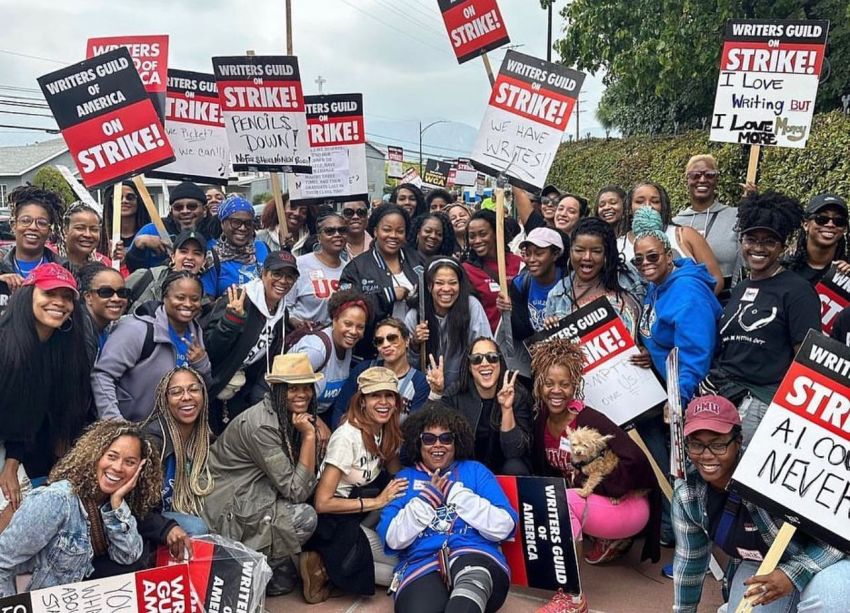
The Writers Guild of America (WGA) secured a tentative agreement with the major Hollywood studios and streaming companies on September 24, ending its nearly five-month-long strike.
The union was up against companies such as Universal, Paramount and Disney, as well as tech giants, such as Netflix, Amazon and Apple. Studio profits have gone up by 39% over the past 10 years – yet an average writer’s salary has dropped by 4%.
WGA members received a summary of the agreement on September 26.
The deal includes increases in base wages (minimums) and residuals (the compensation paid to writers for reuse of their material), addresses the union’s demands for minimum staff in television writers’ rooms, provides for bonus payments based on the success of streaming shows and protections against the use of artificial intelligence (AI).
A big win
The writers’ walkout and pickets began on May 2, after talks broke down between the WGA and the Alliance of Motion Picture and Television Producers (AMPTP), representing the big entertainment bosses.
The union’s industrial action virtually shut down production in the big studios.
Hollywood actors, represented by SAG-AFTRA, who hit the picket lines in mid-July, in pursuit of fair pay and conditions, remain on strike.
Five days of intense negotiations between the WGA and the AMPTP included the chief executives of the four biggest studios, including Disney and Netflix.
The deal will now be voted on by the union’s membership over the next two weeks.
The WGA leadership introduced the tentative agreement, saying: “We set out in this negotiation to address critical issues across our membership, brought on by changes in the business that were driving down writer pay and undermining working conditions.
“Prior to the strike, the companies refused to engage on most issues.”
“This contract—won with the power of member solidarity and our union siblings over a 148-day strike—incorporates meaningful gains and protections for writers in every segment of the membership.”
The WGA said the total value of the deal was US$233 million, up from the initial AMPTP offer of US$86 million.
Pay and conditions
According to the WGA, the three-year film and TV agreement raises basic wages by 5% in the first year, followed by 4% in the second year and 3.5% in the third.
Select residual bases and minimums (the lowest rate WGA members get paid for writing a script) will get lower increases or single increases, according to the union. The latter gains are the most significant to a writer’s overall pay. Residuals are also a central issue for actors.
Bonuses will also be paid to writers based on viewership data on streaming services, including successful series that repeat – sometimes for years. The union will be entitled to receive confidential viewership metrics for this purpose.
According to the Los Angeles Times, “One of the biggest complaints among screenwriters going into contract negotiations was that, in the streaming era, TV seasons have gotten shorter and writers’ rooms have shrunk. That has meant fewer opportunities for writers, who have to cobble together one job after another to make a living.”
The new agreement improves minimum staffing levels. “For series with up to six episodes, three writers must be hired, for example. For shows of 13 or more episodes per season, minimum staffing is six writers, which can include three writer-producers. The minimum employment of writers per episode applies to greenlighted shows, ‘unless a single writer is employed to write all episodes of a season’,” the LA Times reported.
Artificial Intelligence
A critical issue raised in the strike was concern that studios could seek to maximise profits by exploring the use of artificial intelligence (AI) to generate scripts from writers’ previous work, or to draft new scripts.
The new agreement includes language that regulates the studios’ use of AI, reported the LA Times. “Companies must disclose to writers if any material given to a writer has been generated by AI or incorporates AI-generated material…”
The LA Times said: “This was among the final and most difficult deal points to hammer out. Neither side wants to lock itself into contract language that would backfire in three years.”
Justin Halpern, a writer on Abbott Elementary, tweeted on September 27: “I think this is a good deal. It will be tested over the next three years because that’s what always happens. It will be poked and prodded by the AMPTP and business affairs and whomever else is trying to make a little more money by spending less.
“So we have to stay aware of changes in the business, which will come! And as they come we have to adapt the contract to protect ourselves. These contracts are chipped away at, one tiny piece at a time, and if we aren’t constantly paying attention & engaging, we’ll be back here.
“And lastly, we do not win this contract without the help do the teamsters and IATSE [International Alliance of Theatrical Stage Employees] who sacrificed a shit ton for us. When it’s their turn we have to be there for them.”
Writer, filmmaker and musician Boots Riley tweeted the same day: “They were wrong about how much the WGA could win.
“Analysts often look at things w[ith] the perspective that what corporate bosses say is actually true.
“We strike. Shut things down and make them choose. That’s how power works.”